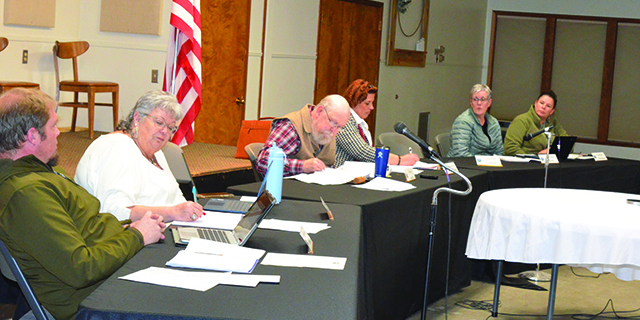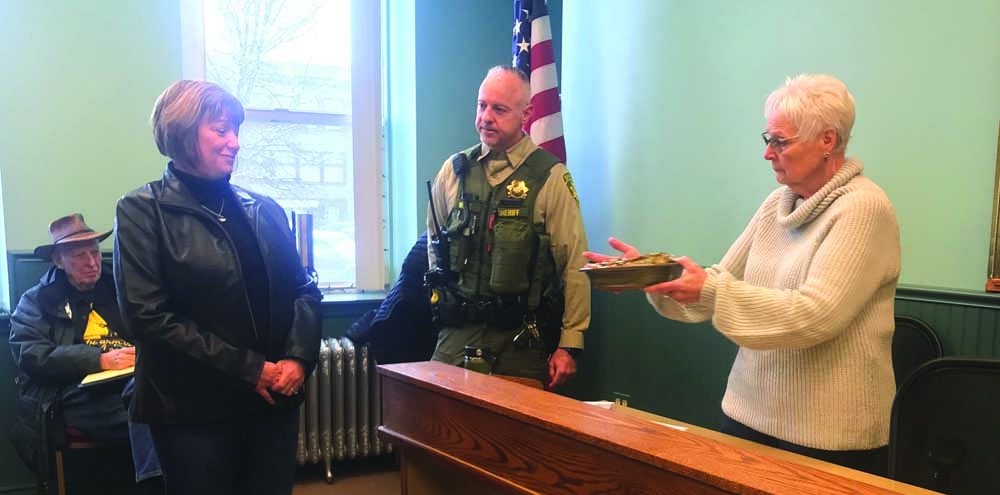A conversation with Rep. Greg Smith
Published 5:00 pm Wednesday, October 7, 2009

- Rep. Greg Smith
Rep. Greg Smith, R-Heppner, whose district includes Wallowa County, met recently with the Chieftain Editorial Board. This is an edited transcript.
This is my fifth term of service in the Legislature and I serve as the ranking member on the House budget committee. I’m not the chairman. I’ve served on the budget committee longer than any other member on the House side, not on the Senate side. When we went in in January, the economy was in a tremendous freefall. In the state of Oregon, in the general fund portion of the budget, we were facing about a $4 billion reduction. The general fund is the dollars that the state of Oregon uses to fund education, health and human services and public safety. Unlike California or Congress, Oregon has a constitutional requirement to balance its budget. We don’t have the ability to borrow or print money. We have two choices, generate additional revenue or make hard cuts. That’s where we were.
As we went through this session, it was a session that was really, really hard on rural Oregon. Attacks on rural Oregon were being manifested every day, from significant reductions in K-through-12 funding for rural Oregon – and there is a special funding for rural schools – all the way to reimbursement rates for Medicare and Medicaid for rural hospitals. They were all under assault. In the end, what it took was leaders trying to figure out where a middle ground was and find out what is the maximum number of reductions that we can get votes for. In the end, we tried to come to the middle and find a solution.
I can tell you what we were able to stave off. There were several pieces of legislation that were advancing. The first one was the forced consolidation of education service districts and the small, remote schools. There was legislation being proposed at the Senate education committee that would have forced us here in Wallowa County to consolidate with other ESDs in other counties much further away. What efficiency would have been had with that I don’t know, but that’s the way we were moving.
The second was the chair of the Senate education committee had legislation that he wanted to advance that would require consolidation of small school districts into a countywide school district. And here in Wallowa County we take pride in our local schools and the last thing we want is to lose that identity. That was a major, major fight for us – to keep the schools from being consolidated.
Simultanously, there was a movement from the governor’s office as part of the rebalance – and he had to make tough decisions – to eliminate funding for FFA and Student Development Leadership. I was not leaving Salem with those programs being cut. Those are programs that serve our youth in this county very, very well, and I just couldn’t turn my back on that, so we worked hard to make sure the funding for those programs didn’t get cut.
There are two areas in this difficult session that I’m most proud of. The first is that there was a property-tax exemption for loggers on their equipment that was set to sunset. Our timber industry is under assault in this county and in Union County. Our mills are shut down here, yet we have small-business owners here who are paying debt-service loans on this equipment when the equipment is standing idle. The state of Oregon was about to enact a property tax on all this idle equipment.
To me, that was just the ultimate salt in the wound and I couldn’t go there, so I worked in a bipartisan manner to get that property tax exemption on logging equipment that dates back to 1992. Before, the sunset was only good for six years, so folks who were purchasing new equipment would get the property-tax exemption, but we don’t have those folks in Wallowa County. Our folks have equipment that’s used, but they’re doing everything they can to hold it together. This was an opportunity to protect them.
That was one thing I was very proud of. The second was holding the reimbursement rates for Type B [rural] hospitals when those were under attack. They were set to take about a 25 percent reduction. Our hospital here in this county is very dependent on Medicare and Medicaid reimbursement rates. We have a senior population that utilizes that service, and when they use the hospital they use the Medicare or Medicaid reimbursement. If that had taken a 25 percent reduction, it would have had a tremendous economic impact on the largest employer in Wallowa County. In the end, we were able to reach a compromise where state base funding for Type B hospitals and the reimbursement rates were maintained. It was a difficult session, but we were able to hold those two things together.
Now here’s where the compromise came in. To balance the state budget, there were two tax initiatives. One was an increase in the corporate minimum tax. I was an adamant “no” vote on that because the worst thing you can do in a recession is to tax business. On top of that, we have a lot of small-business owners right here in Wallowa County who incorporate for legal protection, not for tax purposes. The last thing I think we should have done is tax them. The second piece of legislation is a one-half percent tax on the wealthy – on those families that have a taxable income of more than $250,000. There’s a huge difference between gross income and taxable income, and we don’t have folks in Wallowa County who have taxable incomes exceeding $250,000. So I agreed that if they were willing to protect loggers, I was willing to allow a tax on the wealthy, so I cast a vote for that.
It’s been a difficult decision, but I’d do it again in a second because I think that protecting the folks in this county and Union County is much more important that protecting folks in Portland and Salem.
You did receive some flak for that, though.
I did receive some questions, yes.
Those are the measures on the ballot in January?
Yes. Again, the one on business I was an adamant “no” on. On the tax on the wealthy I cast a “yes” vote, but if I hadn’t, our loggers would not have gotten the property-tax exemption, our hospital would not have gotten the reimbursement rate it needed, FFA would have been gone along with OSU Extension. In our communities, maintaining OSU Extension is vital to agriculture. What I was trying to do is try to figure out how to maintain an economy in a rural setting that is struggling, that is dependent on good schools and good health care and at the same time not create an overly burdensome tax. I had to pick, and I decided to put the loggers at the front of the line.
What do you say to those folks who are trying to overturn the tax measures that would balance the budget?
First of all, I don’t support taxation for the sake of taxation. But I also say we have communities that are worth investing in. I like health care – I like having a reliable emergency room. I like Friday night football. I like the notion that we have FFA programs for our kids. I like the idea that we have OSU Extension. I think making investments in those programs is worth it.
I tell people I was a “no” vote on the business tax, and the tax on the wealthy isn’t a tax on the majority.That was the solution that the majority came up with to balance a budget.
Do you see any solution to the unemployment rate?
Oregon is very dependent on the income tax, and as the income tax goes so goes funding for the state. The solution for Wallowa County is that we have to support small business in the county. We have to do everything we can to make small business attractive for folks to come in a say ‘we want to do business here in Wallowa County. Part of that is making sure we have good schools and good health care. The second thing is to do everything we can to support our natural resource-based economy. We need to make sure that the ag community and the timber community get the support that they need.
When you get down to Salem, you find that we are in the significant minority. People don’t view the agricultural industry or the timber industry the was we do. We are constantly in a battle to maintain those lifestyles. It’s hard. There are people in Salem who, if they had their druthers, would shut down Wallowa County and turn it into a playground. I could sugarcoat it, but that’s just what it is.
What can be done to turn around the real estate downturn?
The first thing we have to do is make Oregon an attractive place to do business. When you’re taking the base away from rural Oregon – that’s the natural resource based economy – you’re not helping. If you have a thriving natural resource-based economy, you also have a thriving Main Street, and when you have a thriving Main Street, you now have a community that’s attractive to outside investors. Until those beginning steps occur, we’re going to continue to struggle. We have to turn that around.
County fairs are getting their budgets cut dramatically. What can be done to have people understand the importance of a county fair?
The first thing we have to do is sustain stable funding for our fairs. If you go visit the county fair board, the first thing they’re going to tell you is that their funding is unstable and for the most part it’s below the minimum amount needed just to maintain an actual fair. The second thing they’ll tell you is that their infrastructure is in need of improvement.
You’re describing the Wallowa County Fairgrounds.
Any county you go to they’re going to tell you this. We need to make those basic investments in the infrastructure of these fairgrounds.
Third, we need to continue to fund 4-H, FFA and Student Development Leadership so these kids have an avenue to take their commodity to showcase it. When you’re at a county fair, it’s more than getting a hot dog and a ride. This is an opportunity for these kids to learn basic entrepreneurial skills. What better way to teach these kids how to build a small business, an economic base?
When those kids show up at the Capitol wearing a pressed white shirt and a tie and their beautiful blue jacket and their pressed black pants and shined shoes, that tells me we’re doing something right versus the kid with his pants hanging halfway down his rear and with nothing to do.
If you’re going to spend a buck, are you going to spend it helping an FFA kid or are you going to put it into that? If I’ve got a vote, we’re going to put it into FFA.
There are folks who are mad at me because I came to the middle on a vote. I came to the middle because logically we aren’t going to pay, and that bothered some people. At the same time, these programs are worth investing in and once they’re gone, they’re gone. There isn’t the legislative muscle in Salem to bring those back over the will of the urban legislators.
People don’t understand that – we have to keep those programs intact. You get over in Portland and these people just look at me and shrug their shoulders. “These are luxuries. Rep. Smith, why are we keeping a luxury?” What are you talking about? Where do you think your food and fiber comes from? “Oh, I’d rather put the money into East Multnomah County gang intervention.” That’s what I’m fighting. There are supermajorities in the House and the Senate. They can pass any legislation they want. I can be belligerent, dig my heels in and they’re going to run right over the top of me. And FFA and 4-H and Student Development – they’re gone. Or I can work to figure out how to work to a compromise to protect those programs we have to have.





